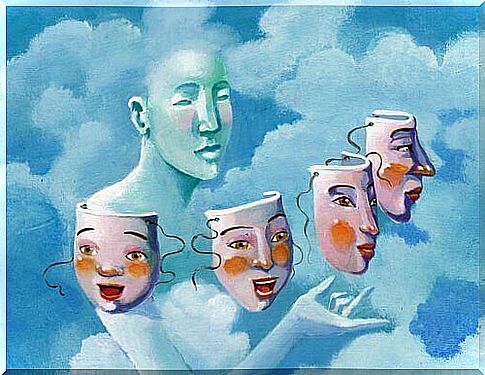Do You Tend To Limit Yourself? 4 Steps To Take Off The Mask

Do you think you are wearing a mask? Do you limit yourself? Is your real self hidden behind armor? Do you relate to other people without showing your emotions? Don’t like to show your vulnerability? Do you feel repressed or inhibited?
If that happens, you are not living fully! It would be better to enjoy your emotions and be able to share them. If you want to feel free, then we’ll explain the 4 steps to take off the mask. The path will not be easy, but you will certainly make it.
For starters, you need to understand that wearing a mask is a defense mechanism, a way to protect yourself. Don’t feed on guilt feelings and try not to “torture” yourself just for wearing this mask. Chances are, you’re doing your best.
In fact, it is common to build seemingly protective barriers. Maybe at first you think that this way no one will be able to hurt you, and that you won’t feel invaded by unpleasant emotions like fear or sadness.
Apparently, or temporarily, the mask can give you this feeling of protection. You feel that you are in control and that you can take it off and on when you need it. Later on, you realize that you ‘ve gotten used to it and that it’s not so easy to show yourself freely, without protections.
The problem arises when, instead of protecting yourself, you lock yourself.
How to stop limiting yourself?

1. Realize and be prepared to remove the mask
The first step in getting your mask off is realizing you’re wearing one. Perhaps you have not realized that you are trying to protect yourself in this way. Fortunately, there are other ways to avoid damage that actually work. You can learn to take better care of yourself.
Once known and identified, for the mask to disappear, this desire must exist. For this, it is important to engage in a positive negotiation with your internal conflicts. For that reason, you need to find the rhythm your mind and heart so desperately need.
2. Have patience and courage and feel supported
Patience is a valuable quality because, among other functions, it manages to maintain motivation. In this sense, it is also related to creating a space for transformation to take place, causing changes that can be sustained over time.
Resolving internal conflicts requires great motivation that only you can nurture. That is why it is imperative to have courage, another powerful quality.
Feeling supported by someone who cares about you, such as a friend, sibling, or a psychologist, will help you stay strong to move forward and be able to stop limiting yourself.
3. Know yourself and accept yourself
In order to accept yourself, it is essential that you first know yourself. Getting to know yourself means knowing what you want, what you like, what you would like to achieve, etc. Maybe you think you have these ideas pretty clear, but it’s likely that you need to get to know yourself a little more.
You can spend more time with yourself alone. This time has to be of silence, without distractions and even without thoughts. The purpose is to be able to feel. Feel the sensations in your body and your emotions.
You may not spend a lot of time being alone for fear of feeling your own emotions, but this is the way to be able to accept yourself. Once you know what you feel, what you are like, and what you like (although you may be different from the rest of people), you can begin to accept yourself as you really are, without judgment.
If you accept yourself, it will be easier to take off your mask, because you will have nothing to be ashamed of.

4. Loving others and yourself
When you have advanced in the process of knowing and accepting, self-love will come naturally. It’s important to love yourself for who you are, not what you were in the past or what you’d like to be in the future.
Love yourself with your qualities, and also with the characteristics that you don’t like so much, but that are part of you. If you want to change them, you could consider them opportunities to learn. In this way you will stay strong.
Loving yourself opens the door for you to love other people. This self-love is what fosters generosity, without it running the risk of responding to a dependency, to a need to give in order to prevent the other from leaving.
I hope you feel empowered to put these 4 steps into practice and stop limiting yourself. If you are already aware that you need to use them, arm yourself with patience and courage, take time to get to know yourself and accept yourself. It will be worth it!









